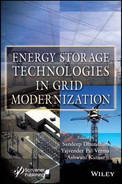Preface
The electrical infrastructure of the grid is aging and there is a need to modernize the existing grid meeting the challenges of the 21st century power sector operation with the penetration of renewable energy sources. Modernization of the grid by incorporating smart grid technologies and moving towards grid digitization will make the power grid resilient to avoid power outages under extreme weather conditions and climatic changes. Energy storage technologies have emerged as a promising solution to address the challenges of grid modernization. These technologies have gained significant attention in recent years due to their potential to enable the integration of renewable energy sources and enhance the resilience, reliability, and flexibility of the electric grid. With the increasing adoption of intermittent renewable energy sources, the need for energy storage technologies has become more critical, as they can help mitigate the variability and uncertainty of these sources and enable their integration into the grid. These technologies enable the efficient and reliable storage of excess energy during times of low demand and the discharge of that energy during times of high demand. Energy storage technologies will act as an ancillary services to the grid for frequency regulation, voltage support, and providing black start capabilities.
This book provides a comprehensive overview of the various energy storage technologies, their applications in grid modernization, and the simulation-based case studies showing their implementation in modern power systems. It covers the overview of current development and research trends and various applications of energy storage technologies and their role in enabling a more sustainable and resilient energy system. The book contains eleven chapters that cover the specific aspect of energy storage technologies in grid modernization. The chapters provide a clear and concise explanation of the key concepts, illustrated by real-world examples and case studies.
In chapter 1, an overview of energy storage technologies, recent trends, role of energy storage in smart/micro grids is presented. The chapter provides opportunities and challenges in energy storage, policy recommendations and practical applications of ESS. Chapter 2 provides comprehensive overview of Li-ion batteries, its materials, operation, charging protocols and fast charging strategies. Chapter 3 deals with an overview of current developments of Super-capacitor-based electrical energy storage technologies. Recent Developments in Biochar-Based EDLC Supercapacitor, Carbon-Based Supercapacitors and current challenges and future potential is discussed.
Chapter 4, deals with the role of energy storage technology in frequency regaultion services. The impact on frequency regulation due to battery energy storage systems, fuel cell, Supercapacitor Energy Storage, and ultra capacitors are analyzed. Chapter 5 provides detailed comparative analysis and performance of Fuel Cells. Chapter 6 described the Machine Learning–Based SoC estimation and recent advances in Battery Energy Storage System techniology. Electrical equivalent and electrochemical model of the BESS are discussed and Machine Learning–Based methods as Support Vector Regression (SVR) and Ridged Extreme Learning Machine (RELM) are applied to SoC estimation. In the chapter 7, dual-energy storage system for optimal operation of grid-connected Microgrid System is analyzed. The modeling of different renewable energy sources are described and role of storage technology on power transfer capability is presented. Chapter 8 deals with the applications of energy storage in modern power system using demand-side management for peak load management, minimizing load variations, and energy storage dispatching. The case studies are provided to show the impact of energy storage technology on the load management. Chapter 9 presents impact of battery energy storage and demand response program on locational marginal prices in distribution system. Five different case studies have been analyzed to show the impact of energy storage systems on the active and reactive power cost in a distribution system. Chapter 10 gives cost-benefit analysis with optimal DG allocation and energy storage system considering the role of demand response technique. The impact of distributed generation from solar PV and wind power generators on system operation and locational marginal prices have been analyzed considering the electrical vehicles in the network. Chapter 11 discusses energy storage systems and charging stations mechanism for Electric Vehicles. The role of energy storage system and its evaluation for EV applications are presented in the context of Indian scenario.
This book is intended for a broad audience, including researchers, engineers, policymakers, and industry professionals working in the field of energy storage technologies and grid modernization. It provides a comprehensive and up-to-date reference for understanding the current state of the art, the challenges and opportunities, key role of energy storage technology in operation and management of smart/micro grids. It provides the potential platform for an innovation and deployment of energy storage technologies in the electric power grid.
We are extremely thankful to all the authors who have contributed their chapters to this book. We sincerely thank all excellent reviewers to give their valuable time providing their crtical evaluation, suggestions and comments for the improvement of the chapters. We sincerely acknowledge their support in the review process and bringing the book to the final stage.
